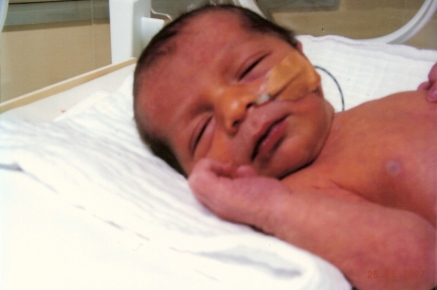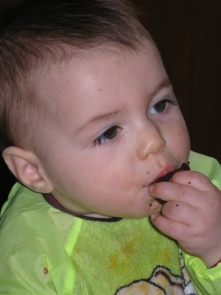There are certain disadvantages to being brave. For example, your dentist might decide to economize on the anaesthetic when drilling your teeth. Or your workmates might nominate you to sing Der Hölle Rache as the warm-up act at your office karaoke party.
Or, even worse, a hospital midwife might not believe that you're in labour.
In Jennifer's case -- a year ago today -- it was the latter. Generally speaking, women in labour tend to have their minds focussed on the agony of the birthing process. Jennifer, on the other hand, preferred to devote her mental resources to her laptop computer. As she explained, there were a number of emails that needed answering before the baby arrived.
This prompted the hospital midwife to assure us that birth was not imminent. "You wait until you're really in labour," she said. "You won't be playing around with your computer then, lovey."
Ten minutes later, Jennifer and her bed were hurtling down the corridor towards the emergency lift.
As a non-patient, I wasn't permitted to enter the lift with Jennifer. "Take the stairs and meet us down at the birthing suite," snapped the midwife.
"No, don't go!" said Jennifer, as the lift doors closed. I sprinted downstairs. The emergency lift delivered Jennifer directly to the birthing suites. The stairs delivered me to a reception desk, a locked door, and a formidable-looking receptionist.
By this stage I was rather agitated. "My wife's in emergency labour," I gabbled at the receptionist. "And she's been taken down in the emergency lift, and I've got to find her birthing suite, and it's an emergency."
The receptionist gazed at me without emotion. "I can't do anything," she said, "until your wife's information has been entered into our system. Please have a seat in the waiting room."
"But this is an emergency," I yelped.
"When the paperwork has been processed by staff," said the receptionist calmly, "the information will come up on my computer, and you can go in. But until then you have to go to the waiting room.
I was -- and I'm not joking -- just readying myself to jump over the reception desk, when I heard someone calling my name. It was a friend who works as a nurse. Ignoring the receptionist's protests, she swiped open the door with her security card, and led me directly to the birthing room.
When I arrived, Jennifer was alone on the bed. "Glad to see you," she whispered. Some distance away a knot of hospital midwives stood gossiping.
Jennifer was not being monitored in any way. I called out to the midwives: "Excuse me, but my wife has pre-eclampsia -- you'll be wanting to keep an eye on her blood pressure as well as the baby's heart rate."
One of the hospital midwives turned to me. "I've phoned your own midwife, and she'll be coming soon," she said. "We'll give your wife an examination if your midwife's not here in 20 minutes."
"Should I be pushing?" called Jennifer anxiously. "I know that it's dangerous to push too early."
"When it's time to push, dear," said the midwife, "you won't be able to stop yourself."
Jennifer realized that she couldn't stop herself. I took a wet flannel, and began to wipe the perspiration from her brow. Each time I drew the flannel across her forehead, Jennifer said: "Thank you, David."
After a few minutes, one of the midwives wandered over, and lifted Jennifer's hospital gown. "Oh," she said in astonishment, "I can see the top of your baby's head."
The other midwives stopped gossiping. They looked silently at one another, and then quickly filed out of the room. The hospital midwife who'd noticed the baby's head was the last to leave. "Someone will be along momentarily," she called over her shoulder.
It didn't seem the right time to point out her incorrect usage of the word 'momentarily'.
A few seconds later, a gowned figure appeared at the door. She glided into the room using the disconcerting style of locomotion favoured by nuns (those of you unfamiliar with nuns should imagine a Dalek).
She halted at the foot of the bed. She spoke very softly to Jennifer: "You're doing well. Keep pushing. Nearly there."
"Another push. That's it."
Our own midwife materialized at the door. She strode into the room. There was a moment's confusion; and then our midwife was holding a baby in her hands -- like a fielder snatching a ball from the air just before the boundary.
A terrible scream reverberated through the birthing room. "Nothing wrong with your son's lungs," observed our midwife.
It took nearly an hour for a nurse to stitch up Jennifer's wounds. In short order, Jennifer and the baby were relocated to the maternity ward. In even shorter order -- as a consequence of hospital regulations that prohibit men from staying overnight -- I was ejected into the hospital parking lot.
It was snowing. My car wouldn't start. I called State Roadside Rescue. Amusingly, they kept cutting me off before I could give my location. It was four o'clock in the morning. Eventually I started to walk home. It didn't seem possible that I was a father.
The next morning, Jennifer called me with news that the baby wasn't feeding properly. When I arrived back at hospital the midwives were calm and reassuring. "Nothing to worry about," they soothed. "We see this all the time. Babies have sufficient reserves to go happily for days with minimal feeding. "
The next morning they reiterated their reassurances. On the third morning, one of the midwives decided the baby needed a cold bath in order to wake him properly for a feed. The baby wasn't screaming anymore by this stage -- he just mewed piteously as tepid water sluiced over him.
The night matron came to see us at the start of the evening shift. "I've looked over your notes and I'm worried about the possibility of brain damage," she said. "We need to get your baby to the intensive care unit right now."
It's taken me an entire year to build up the courage to convert my diary jottings into readable form -- to force myself to think about feeding-tubes, incubators, parents weeping beside cradles. Ten days with a baby in intensive care seemed like eternity; although it was utterly trivial compared with the experience of some families.
But, even in prose, I wouldn't want to re-live any part of it.
.
Above: Bob-the-baby in the intensive care unit (three days old).
Above: Bob-the-baby eating cake on his first birthday.

